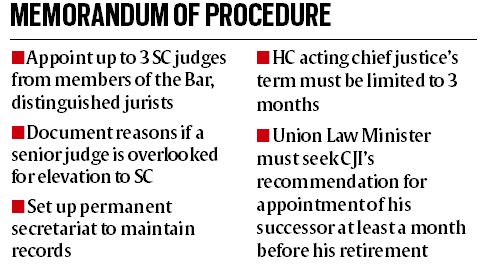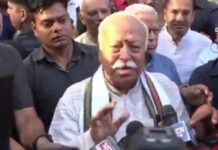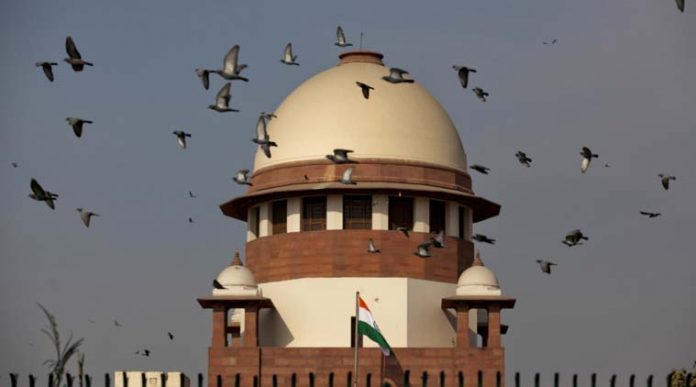FOR THE first time, the government has sought to include “merit and integrity” as “prime criteria” for appointment of judges to the higher judiciary. It has also proposed selection of up to three lawyers and jurists as Supreme Court judges, documentation of the reasons why a senior judge was overlooked for elevation, and establishment of a permanent secretariat to maintain records.
The new Memorandum of Procedure (MoP), finalised by a Group of Ministers (GoM) headed by External Affairs Minister Sushma Swaraj last week, seeks to introduce performance appraisal as a standard for appointing chief justices of high courts and Supreme Court judges.
According to the MoP, evaluation of judgments delivered by a high court judge during the last five years and initiatives undertaken for improvement of judicial administration should be a yardstick of merit for promotion as chief justice of a high court.
It further states that a high court should not have an acting chief justice for more than three months, while awaiting appointment of a full-time chief justice by the Collegium.
 The new MoP proposes that for appointment of judges in the Supreme Court, the “prime criteria” should be “seniority as chief justice/ judge of the high court” as well as “merit and integrity”.
The new MoP proposes that for appointment of judges in the Supreme Court, the “prime criteria” should be “seniority as chief justice/ judge of the high court” as well as “merit and integrity”.
Notably, the earlier MoP drafted in 1999 did not mention “merit and integrity” as eligibility criteria.
Advocating “fair representation” of all high courts in picking SC judges, the government has said preference should be given to the chief justices of high courts, keeping in view their inter-se seniority. In case a senior chief justice of a high court is being overlooked for elevation to the Supreme Court, “the reasons for the same (should) be recorded in writing”.
At present, no records are put in public domain by the Collegium to show why a judge is not elevated to the Supreme Court despite his seniority.
Another key change being sought by the NDA government pertains to appointment of lawyers and jurists as judges. The MoP states that up to three judges in the Supreme Court need to be appointed from among the eminent members of the Bar and distinguished jurists with proven track record in their respective fields.
Further, for appointing lawyers and jurists as judges, the government has proposed that “it shall be open to all judges of the Supreme Court” to make suitable recommendations to the Collegium, which comprises the Chief Justice of India and four senior-most judges of the apex court.
The other proposals in the MoP, which has been forwarded to CJI T S Thakur for consultation, are:
A permanent secretariat to be set up in the Supreme Court for maintaining records of high court judges, scheduling meetings of the SC Collegium, receiving recommendations as well as complaints in matters related to appointments.
The Union Law Minister should seek the recommendation of the incumbent CJI for appointment of his successor at least one month prior to his retirement.
A notice for vacancies of judges should be put up on the website of the high courts at the beginning of the year for appointments.
A permanent secretariat for the High Court Collegium to process appointments.
After it quashed the proposed National Judicial Appointments Commission (NJAC), the Supreme Court’s Constitution Bench had, in December 2015, left it to the Centre to consult the CJI for drafting the new memorandum for appointments of judges to the higher judiciary. The Bench had listed “broad suggestions for consideration” but refrained from issuing positive directives to improve the Collegium system.
No judge has been appointed in the apex court for over a year owing to the stalemate over validity of the NJAC and the subsequent procedure to draft the MoP.
Source : Times of India



























